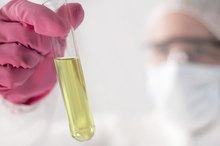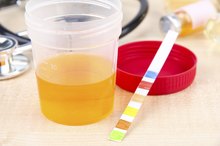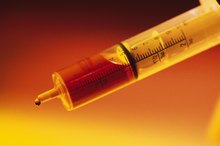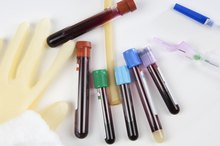Normal Levels of Urine Creatinine & Protein
Urine tests commonly measure protein and creatinine to check for the presence of kidney disease or dysfunction 3. Protein in your urine is abnormal and prompts follow-up testing. If your kidneys do not work properly, your doctor may need to test your urine regularly to monitor kidney function. Sometimes your doctor may order protein and creatinine tests if you are taking medications that can affect kidney function 3.
If you are experiencing serious medical symptoms, seek emergency treatment immediately.
Creatinine
Creatinine is the waste product produced by normal muscle contractions 2. It is made from creatine, which your muscles require for energy. Women tend to have lower creatinine levels than men because they have less muscle tissue. Creatinine levels normally do not vary from day to day because your muscle mass generally stays the same. Aging and malnourished people and vegetarians may have lower than normal creatinine levels.
Increased creatinine levels indicate that kidney function has been affected by disease or other conditions. Infection or autoimmune disease can damage the blood vessels in the kidneys, resulting in elevated creatinine. Other causes of elevated creatinine include reduced blood flow to the kidneys from shock, dehydration, diabetes or heart failure. Drugs and toxins can kill kidney cells. Kidney stones and prostate disease also affect creatinine levels.
- Creatinine is the waste product produced by normal muscle contractions 2.
- Other causes of elevated creatinine include reduced blood flow to the kidneys from shock, dehydration, diabetes or heart failure.
Normal Creatinine Values
Low Creatinine & BUN Counts
Learn More
The normal creatinine level for men is 0.5-1.5 mg/dL 2. The normal level for women is 0.6-1.2 mg/dL. If you are are very muscular, you may have slightly higher creatinine levels. A high creatinine level means that kidney damage is present 2. One instance of elevated creatinine is not enough to diagnose kidney disease, however 2. If your doctor suspects kidney disease, she will likely order additional tests to assess kidney function, such as glomerular filtration rate, creatinine clearance and blood urea nitrogen 3.
Protein in the Urine
When your kidneys are working properly, their tiny filters called nephrons remove waste products from the blood so that your body can expel it in urine. Large molecules such as red blood cells and protein, also called albumin, stay in the blood. When your nephrons are damaged, albumin and other proteins leak into your urine. Urine dipstick tests and 24-hour urine collections check for protein in your urine. The presence of protein in your blood is abnormal. Urinary tract infections and diabetes can cause albumin to appear in your urine. Other conditions, such as:
- heavy metal poisoning
- bladder cancer
- hypertension
- systemic lupus erythematosus
- can cause protein in the urine as well
- When your kidneys are working properly, their tiny filters called nephrons remove waste products from the blood so that your body can expel it in urine.
- When your nephrons are damaged, albumin and other proteins leak into your urine.
Tips
How Does Creatine Affect the Kidneys?
Learn More
If you have protein in your urine or elevated creatinine, you are unlikely to notice any signs or symptoms at first. Your urine may also become foamy, bloody or coffee colored. Urine output may decrease and you may have flank, or low back, pain.
Certain drugs, such as vancomycin and gentamicin can cause kidney damage. Your doctor may monitor your kidney function when taking these drugs, especially if you have a history of kidney disease. Other drugs, such as cefoxitin, can cause elevated creatinine that does not indicate kidney damage.
- If you have protein in your urine or elevated creatinine, you are unlikely to notice any signs or symptoms at first.
- Other drugs, such as cefoxitin, can cause elevated creatinine that does not indicate kidney damage.
Related Articles
References
- Life Options: Lab Values Explained
- Lab Tests Online: Creatinine
- Clinical Diagnosis By Laboratory Methods, Todd-Sanford, 15th edition, 1974.
- Note: All normal ranges are dependent on the laboratory and method used for testing
Writer Bio
Roma Lightsey has written for "Grit," "Arthritis Today," and "The Clinical Advisor," a journal for nurse practitioners. Lightsey holds a Bachelor of Arts in communications, a Bachelor of Science in nursing, and a Masters of Science in nursing. She currently teaches nursing and works for a medical device company when not busy writing.









